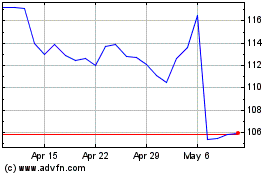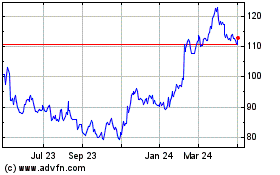Disney Closing Hong Kong Property as Government Looks to Halt Virus -- Update
July 13 2020 - 3:57PM
Dow Jones News
By Micah Maidenberg and Andrew Dowell
Walt Disney Co. said it would again close the Hong Kong
Disneyland theme park, less than a month after it reopened, amid an
increase of new coronavirus cases in the city, in a new setback for
the entertainment company.
The reversal highlights the challenge a multinational company
such as Disney faces in navigating strategies in disparate
jurisdictions as governments around the world adopt different
approaches to combating the spread of Covid-19. Disney has reopened
some of its theme parks at reduced capacities while implementing
heightened safety measures.
The closure comes as Hong Kong officials said activities such as
large social gatherings, dining in at restaurants and going to the
gym would be temporarily suspended. For three weeks Hong Kong had
no local infections, but after an outbreak that began July 5, the
city has racked up more than 180 locally contracted cases.
Carrie Lam, Hong Kong's chief executive, said at a press
conference that the theme park would have to shut under the city's
new regulations.
"As required by the government and health authorities in line
with prevention efforts taking place across Hong Kong, Hong Kong
Disneyland park will temporarily close from July 15," a Disney
spokeswoman said Monday. Hotels at the property will remain open
with adjusted service levels, she added.
Over the weekend, Disney reopened two main parts of Disney World
in Orlando -- Magic Kingdom and Animal Kingdom -- at reduced
capacities as Florida hit a record on Sunday of more than 15,000
new coronavirus cases.
Many U.S. businesses had hoped for a smooth transition to more
normal levels of business activity this summer after lockdowns only
to see those plans complicated by rising new coronavirus cases in
some markets.
Macy's Inc. said earlier this month it had reopened most
locations, but Chief Executive Jeff Gennette said many of the malls
where it had stores were still shut or could be if virus cases
increased. Apple Inc. temporarily closed dozens of stores,
including in Texas and Florida.
Executives at Nike Inc. said last month the company didn't
expect a linear recovery. Meanwhile, bars and restaurants in New
York City weren't allowed to start offering indoor dining due to
rising infection rates in other states and a lack of compliance
with social-distancing rules and enforcement of such measures.
In January, Disney closed the Hong Kong park as the coronavirus
was spreading in China and elsewhere, describing the shutdown as a
precautionary measure meant to protect the health and safety of
customers and staff.
The park reopened last month, with enhanced health and safety
measures. The company said then it would increase the frequency of
cleaning and limit the number of people allowed in to help visitors
comply with social-distancing rules. Guests also had to book trips
to the facility ahead of time.
Disney owns a 47% stake in the Hong Kong property, with a
government entity for the region holding the remaining portion, the
company said in its annual report covering its fiscal year that
ended in late September of last year.
The park sits on 310 acres on an island near the Hong Kong
International Airport and offers seven themed areas, including Main
Street USA and Toy Story Land, the report said.
The company's main two parks at Walt Disney World Resort in
Orlando, Magic Kingdom and Animal Kingdom, reopened last week with
significantly reduced capacity.
Disney is looking to resume operations at the attraction as the
coronavirus spreads in Florida, with a record of more than 15,000
new cases reported in the state on Sunday.
Disney had pulled back on plans to reopen its Disneyland
property in Southern California around the same time as Disney
World. Employees at the California park protested the plan, worried
about safety, and the state government there said guidelines for
reopening theme parks wouldn't be ready for the property to be
reopened as planned.
The Shanghai Disneyland property, meanwhile, is only open to
guests who make advanced reservations, with a limited number of
tickets available each day, according to a July 13 statement on the
website for that park.
The theme-park business is a key driver of revenue for Disney,
one that has been especially hit hard by the pandemic. In May,
Disney said revenue for its quarter ended March 28 for its unit
that includes parks fell 10% from the year earlier to $5.54 billion
and operating income dropped 58% to $639 million.
RT Watson contributed to this article.
Write to Micah Maidenberg at micah.maidenberg@wsj.com and Andrew
Dowell at andrew.dowell@wsj.com
(END) Dow Jones Newswires
July 13, 2020 15:42 ET (19:42 GMT)
Copyright (c) 2020 Dow Jones & Company, Inc.
Walt Disney (NYSE:DIS)
Historical Stock Chart
From Mar 2024 to Apr 2024

Walt Disney (NYSE:DIS)
Historical Stock Chart
From Apr 2023 to Apr 2024
